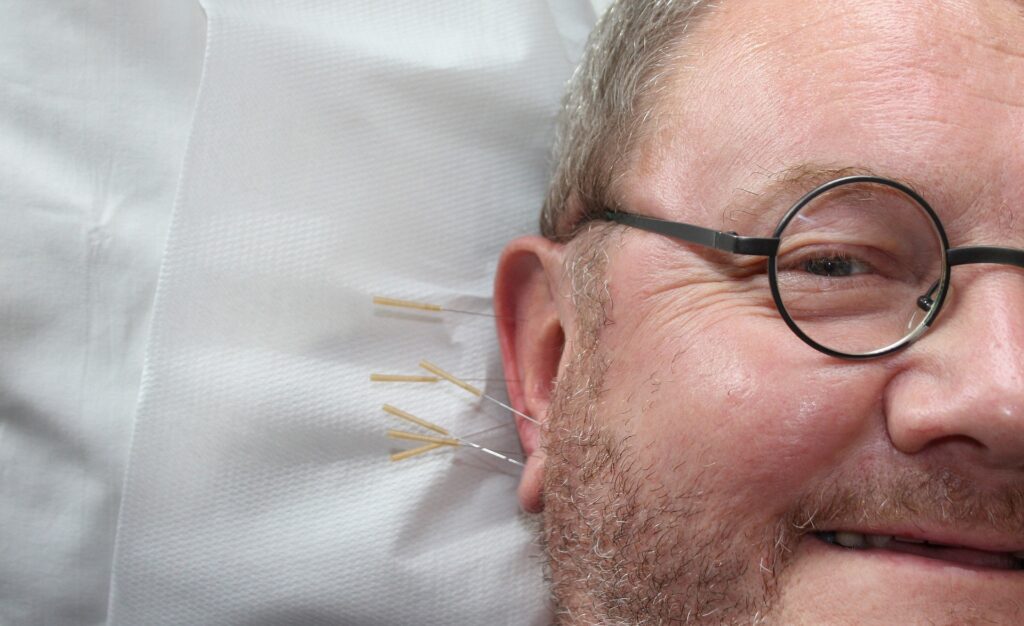Can acupuncture help with weight loss?
In the pursuit of weight loss, people often seek various methods to complement their diet and exercise routines. One alternative approach gaining attention is acupuncture. Originating from traditional Chinese medicine, acupuncture involves the insertion of thin needles into specific points on the body to stimulate various physiological responses. While it is not a standalone solution for weight loss, acupuncture may offer benefits that support a holistic approach to achieving and maintaining a healthy weight. In this article we will explore 10 Effective Ways on how Acupuncture can Help in Weight Loss.

10 Effective Ways How can acupuncture Help with Weight Loss
Acupuncture, an ancient practice rooted in Traditional Chinese Medicine, has gained recognition for its potential to support weight loss efforts. While it is not a magical solution for shedding pounds, acupuncture can be a valuable tool in a comprehensive weight loss plan. Here are 10 effective ways acupuncture can help in weight loss:
1.Appetite Regulation: Acupuncture can help regulate appetite by targeting specific points that influence hunger and satiety signals. It may help reduce cravings, control overeating, and promote a balanced approach to food.
2.Metabolism Boost: Acupuncture sessions can stimulate the body’s metabolic function, aiding in the efficient breakdown of nutrients and energy production. This boost in metabolism can support weight loss by increasing calorie burn.
3.Stress Reduction: Stress and emotional factors often contribute to weight gain or hinder weight loss efforts. Acupuncture has a calming effect on the nervous system, reducing stress levels and promoting emotional well-being. By managing stress, acupuncture indirectly supports weight management.
You may also like.Start Your Weight Loss Journey
4.Digestive System Support: Acupuncture can optimize digestive function by stimulating the digestive organs and improving nutrient absorption. It may help address digestive imbalances that can hinder weight loss progress.
5.Hormonal Balance: Acupuncture has been shown to regulate hormonal imbalances that can contribute to weight gain, such as insulin resistance and thyroid issues. By promoting hormonal balance, it can support weight loss efforts.
6.Cravings and Emotional Eating: Acupuncture can target specific points related to cravings and emotional eating. By addressing the underlying causes of these behaviors, it helps individuals develop healthier relationships with food and make conscious choices.
7.Energy Enhancement: Acupuncture sessions can boost energy levels by stimulating the body’s energy flow. Increased energy can lead to improved motivation for physical activity, promoting calorie expenditure and weight loss.
8.Sleep Quality Improvement: Adequate sleep is crucial for weight management. Acupuncture can help improve sleep quality by addressing underlying factors such as insomnia or sleep disturbances. Better sleep enhances overall well-being and supports weight loss efforts.
9.Water Retention Reduction: Acupuncture can assist in reducing water retention, which can lead to temporary weight gain and bloating. By promoting healthy fluid balance, it helps individuals achieve a more accurate representation of their weight.
10.Overall Wellness Promotion: Acupuncture is a holistic practice that focuses on balancing the body’s energy systems. By promoting overall wellness, it supports weight loss efforts by addressing underlying imbalances and creating a harmonious state.
Acupuncture Safety and Side Effects
Acupuncture is generally considered a safe form of therapy when performed by a qualified and licensed practitioner. It has a long history of use and has been practiced for thousands of years. However, like any medical procedure, there are certain safety considerations and potential side effects to be aware of. Understanding the safety profile of acupuncture can help individuals make informed decisions about its use for various health conditions, including weight loss.

Safety of Acupuncture
When performed by a skilled practitioner, acupuncture is generally safe and well-tolerated. Licensed acupuncturists undergo extensive training to ensure the proper application of acupuncture techniques and to maintain a safe treatment environment. They follow strict protocols to minimize the risk of complications and adhere to high standards of hygiene.
Potential Side Effects
While acupuncture is generally safe, some individuals may experience mild side effects. These side effects are typically temporary and subside on their own. The most commonly reported side effects of acupuncture include:
- Soreness or Discomfort: Some individuals may experience mild soreness or discomfort at the site where the needles were inserted. This is usually brief and resolves quickly.
- Bruising or Bleeding: Occasionally, small bruises or minor bleeding may occur at the needle insertion points. These are usually minimal and heal without any complications.
- Dizziness or Lightheadedness: Some individuals may feel lightheaded or dizzy during or after acupuncture. This is typically temporary and often related to the body’s response to the treatment.
- Fatigue or Drowsiness: It is not uncommon to feel a sense of relaxation, fatigue, or drowsiness following acupuncture. This can be attributed to the body’s release of endorphins and the overall calming effect of the treatment.
- Emotional Release: Acupuncture can sometimes trigger emotional release or bring up repressed emotions. This is considered a positive response, as it indicates that the body’s energy is rebalancing.
What Does Research Say about Acupuncture?
Research on the effectiveness of acupuncture for weight loss is ongoing, and while there is some evidence to suggest its potential benefits, more studies are needed to draw definitive conclusions. It is important to review the existing research to gain insights into the current scientific understanding of acupuncture’s role in weight loss.

Clinical Studies on Acupuncture and Weight Loss
Several clinical studies have explored the effects of acupuncture on weight loss and related factors. Here are some key findings:
Appetite Regulation: Research suggests that acupuncture may influence appetite regulation by modulating the release of hormones and neurotransmitters involved in hunger and satiety signals. It may help reduce food cravings and improve portion control.
Metabolic Effects: Some studies indicate that acupuncture may have positive effects on metabolism by stimulating the body’s energy flow and promoting digestive function. Improved metabolism can potentially contribute to increased calorie burn and weight loss.
Stress Reduction: Acupuncture has been found to have a calming effect on the nervous system, helping to reduce stress and anxiety levels. As stress and emotional factors often contribute to weight gain or hinder weight loss efforts, acupuncture’s stress-reducing effects may indirectly support weight management.
Quality of Life: Acupuncture has shown promise in improving overall quality of life for individuals undergoing weight loss efforts. It can help reduce fatigue, improve sleep quality, and enhance emotional well-being, which can positively impact weight management.
It is worth noting that while individual studies show promising results, more rigorous and larger-scale studies are needed to establish the effectiveness of acupuncture specifically for weight loss.
Mechanisms of Action
The exact mechanisms through which acupuncture may influence weight loss are still being investigated. However, some proposed theories include:
Neuroendocrine Modulation: Acupuncture may affect the release of hormones, such as ghrelin and leptin, which are involved in appetite regulation.
Stimulation of Metabolic Function: Acupuncture points targeted during treatment may stimulate metabolic processes and improve the efficiency of digestion and nutrient absorption.
Stress Reduction and Emotional Support: By reducing stress levels and promoting emotional well-being, acupuncture may help individuals develop healthier relationships with food and eating habits.
The Need for Further Research:
While existing studies provide valuable insights, further research is necessary to establish the efficacy of acupuncture for weight loss definitively. Larger, well-designed clinical trials with control groups are needed to assess the specific effects of acupuncture, determine optimal treatment protocols, and compare it to other weight loss interventions.
How Many Acupuncture Sessions Will I Need for Weight Loss?
When considering acupuncture for weight loss, one common question that arises is how many sessions are typically required to achieve desired results. The number of acupuncture sessions needed can vary depending on various factors, including individual goals, starting weight, overall health, and response to treatment. While there is no one-size-fits-all answer, understanding some general guidelines can provide a better idea of what to expect.
Individualized Approach
It’s important to recognize that acupuncture is a highly individualized therapy. Each person’s body and circumstances are unique, and therefore, the number of acupuncture sessions required for weight loss may differ from one individual to another. A qualified acupuncturist will assess your specific situation and develop a treatment plan tailored to your needs.
Factors Affecting the Number of Sessions
Several factors can influence the number of acupuncture sessions necessary for weight loss:
- Starting Weight: Individuals with a higher starting weight may require more acupuncture sessions to achieve their weight loss goals compared to those with a lower starting weight.
- Weight Loss Goals: The extent of weight loss desired also plays a role. If significant weight loss is the goal, it may require a more extended course of acupuncture treatment.
- Overall Health: An individual’s overall health and underlying conditions can affect the response to acupuncture. For some individuals, additional sessions may be necessary to address specific health concerns that impact weight loss.
- Lifestyle Factors: Lifestyle factors, including diet and exercise habits, can influence the effectiveness of acupuncture. Combining acupuncture with healthy lifestyle choices can enhance its impact on weight loss.
Typical Course of Acupuncture for Weight Loss
While the exact number of sessions varies, a typical course of acupuncture for weight loss may involve multiple sessions spread over several weeks or months. Initially, weekly or bi-weekly sessions may be recommended to establish a foundation and assess how the body responds to treatment.
Based on progress and individual factors, the acupuncturist may adjust the frequency of sessions. As weight loss goals are approached, the frequency may be reduced, with monthly sessions for maintenance and support.
The Importance of Consistency
Consistency is key when it comes to acupuncture for weight loss. Regular and consistent sessions allow the body to respond and adapt to the treatment. Skipping or spacing sessions too far apart may hinder progress and slow down the desired outcomes.
Open Communication with the Acupuncturist
To determine the ideal number of sessions for your weight loss journey, it is crucial to maintain open communication with your acupuncturist. They will monitor your progress, assess your response to treatment, and make any necessary adjustments along the way.
When to Speak with a Doctor?
While acupuncture can be a beneficial therapy for weight loss and various health conditions, it is important to recognize that it is a complementary approach and not a substitute for medical care. There are certain situations where it is advisable to speak with a doctor before pursuing acupuncture or if you experience specific symptoms or concerns. Here are some instances when consulting with a healthcare professional is recommended:

- Existing Medical Conditions: If you have any pre-existing medical conditions, such as cardiovascular disease, diabetes, or hormonal imbalances, it is important to consult with your doctor before starting acupuncture. They can provide guidance on how acupuncture may fit into your overall treatment plan and ensure it is safe in conjunction with your existing medical care.
- Medication and Treatment Interactions: If you are currently taking medications or undergoing other treatments for weight loss or any other health condition, it is crucial to discuss acupuncture with your doctor. They can assess potential interactions, ensure the safety and compatibility of acupuncture with your current treatment regimen, and provide appropriate guidance.
- Undiagnosed Symptoms or Unexplained Weight Loss: If you are experiencing unexplained weight loss or have undiagnosed symptoms, it is important to consult with a doctor to rule out underlying medical conditions. Acupuncture should not be used as a primary intervention for unexplained weight loss or without a proper diagnosis.
- Severe or Rapid Weight Loss: If you are experiencing severe or rapid weight loss, it is essential to consult with a doctor. Sudden and significant weight loss can be a sign of underlying health issues that require medical attention. Acupuncture alone may not address the root cause of rapid weight loss.
- Persistent Symptoms or Adverse Reactions: If you experience persistent symptoms or adverse reactions following acupuncture, it is advisable to speak with a healthcare professional. While rare, severe adverse reactions or prolonged discomfort should be addressed promptly.
- Pregnancy: If you are pregnant or trying to conceive, it is crucial to inform your doctor and acupuncturist. Certain acupuncture points and techniques may not be appropriate during pregnancy, and your healthcare team can provide guidance on the safety and suitability of acupuncture during this period.
- Individual Health Concerns: If you have specific health concerns or questions about how acupuncture may impact your overall well-being or weight loss efforts, consulting with a healthcare professional can provide personalized advice and guidance based on your unique circumstances.
The Power of a Positive Mindset
Having a positive mindset is a powerful tool that can greatly influence your overall well-being and success in various aspects of life, including weight loss. It involves cultivating an optimistic and hopeful outlook, focusing on possibilities rather than limitations, and maintaining a constructive attitude even in challenging situations. Embracing a positive mindset can bring about numerous benefits and support your weight loss journey.
Conclusion
While acupuncture alone cannot guarantee weight loss, it can be a valuable complementary therapy in conjunction with a balanced diet, regular exercise, and healthy lifestyle choices. By promoting appetite regulation, metabolism, stress reduction, and overall well-being, acupuncture may support individuals on their weight loss journey. It is important to consult with a licensed acupuncturist to discuss individual goals and determine the best approach to incorporate acupuncture into a comprehensive weight management plan.
Disclaimer: The advice and suggestions mentioned in the article are for general information purpose only and it should not be taken as professional medical advice. Always consult your doctor if you have any questions or concerns.
FAQs
Can acupuncture alone help me lose weight?
Acupuncture should be seen as a complementary therapy rather than a standalone solution for weight loss. It can support overall weight management efforts but should be combined with a healthy diet, regular exercise, and lifestyle changes.
How many acupuncture sessions are typically required for weight loss?
The number of sessions required varies depending on individual factors, such as starting weight, goals, and overall health. Typically, a course of acupuncture for weight loss may involve multiple sessions spread over several weeks or months.
Are there any side effects of acupuncture for weight loss?
Acupuncture is generally considered safe when performed by a trained and licensed practitioner. However, minor side effects such as temporary bruising, soreness, or dizziness may occur. It is important to choose a qualified acupuncturist and communicate any pre-existing medical conditions or concerns.
Is acupuncture effective for targeting specific areas of body fat?
Acupuncture is not a spot-reducing technique and cannot specifically target certain areas of body fat. Instead, it focuses on supporting overall well-being, metabolism, and appetite regulation, which can indirectly contribute to weight loss throughout the body.
How long do the effects of acupuncture for weight loss last?
The effects of acupuncture are individualized, and longevity depends on various factors, including lifestyle choices, diet, exercise, and overall health. To sustain the benefits, regular acupuncture sessions, along with healthy habits, may be recommended.
Is acupuncture suitable for everyone seeking weight loss?
Acupuncture is generally safe for most individuals; however, certain conditions or medications may require caution or adjustments in the treatment approach. It is essential to consult with a qualified acupuncturist to determine if acupuncture is suitable for your specific situation.




